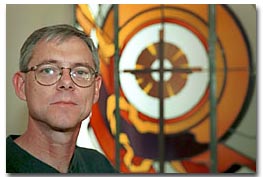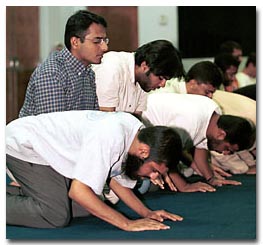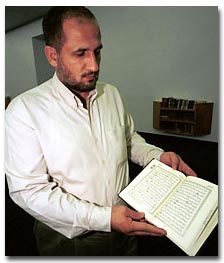By
Carrah Bechtel
Arizona Summer Wildcat
Religious Centers on Campus Focus on Outreach to Students
On some days, it seems like they're everywhere. Whether it's a preacher sharing his Christian doctrine or a Hare Krishna playing a tambourine, it feels like religion often tries to nudge its way into UA students' everyday lives.
While it may appear that many students have grown weary of the constant bombardment of different dogmas, doctrines and beliefs while on the University of Arizona campus, three centers - The Hillel Foundation, The Islamic Center of Tucson and Campus Christian Center - exist in an attempt to help students adjust to campus life and answer questions about faith and the brooding personal questions that tend to plague college-aged students.
And - the organizations insist - they're not trying to convert anybody.
The Hillel Foundation, located at 1245 E. Second St., is one of more than 110 Hillel foundations around the world designed to meet the spiritual and cultural need of Jewish students.
Hillel's goal, written on the mission statement on the front wall of the lobby, is "to provide students at the University of Arizona and in the Tucson Metropolitan area with an atmosphere that fosters enhancement of Jewish life."
Michelle Blumenberg, executive director of UA's Hillel, believes the foundation achieves this goal by providing a place where people can feel connected.
"We connect with the Jewish community in two ways, either religiously or culturally," Blumenberg said. "There are 3,500 Jewish students on campus. That's about 10 percent of the student population all with different ways of expressing their Jewish identity. It's about a way of life."
Because Judaism can be expressed either as a cultural identity or a religious faith, Hillel has the unique task of providing services that emulate the spectrum of Jewish life.
"Some students come to us who are very steeped in the Jewish faith culturally and religiously and they want to continue that here," Blumenberg said. "Others haven't had connections to Judaism since their Bar/Bat Mitzvah at 13 years old. They come to us wanting to learn more."
Blumenberg also said the foundation serves to help students who are dealing with the stresses of life, something she believes can be closely intertwined with the faith itself.
"Jewish history is also both religious and cultural," she added. "When you look at the Torah as a way of life and you're having a problem or a crisis it can help guide you. You may not be dealing with who's sheep belongs on which land, but the core issues are the same."

|
|
ERIC M. JUKELEVICS/Arizona Summer Wildcat
|
|
Rev. Allen Breckenridge, the Episcopal Chaplain, wants students to know that the center embraces liberal practices and thinking.
|
Information about Jewish history and religious counseling are available to help answer questions for students who want to learn more about their identity or heritage.
Some students have even found their heritage via the Israel Birthright Program, an experience that allows Jewish students to connect with the past.
"This program provides Jewish students the opportunity to visit Israel for the first time," Blumenberg said. "It's a 10-day experience with touring and educational components. We engage in discussions about history and politics and introduce students to Israeli families to expose them to the culture."
Because Hillel is a foundation that is open to all denominations of Judaism, including Orthodox, it must provide a variety of kosher foods for the students. Oy Vey! Cafˇ is located in Hillel and provides kosher food with a Middle Eastern flare with vegetarian options.
It's 7:30 on a Monday night, and Omar Shahin is leading prayer for 20 members of his Muslim community at the Islamic Center of Tucson, located at 901 East First Street.
As he steps to the microphone and begins to sing in Arabic, the four walls transform themselves from a simple quiet place to a scared and holy room that allows the noise of the day and the stresses of school to disappear.
The Islamic Center has the smallest - yet most devout - following of any religious group in the campus area. Shahin, who serves as the Imam, or secular community leader, said about 100 people a day come to pray and about 900 come on Fridays when prayer is mandatory for Muslims. Ninety percent of those who pray each day are students.
The center focuses on study needs and religious concerns for the faith that most consider to be the minority on campus.
"The Islamic Center serves as a club for the students," Shahin said. "They come here to pray, study, eat and socialize."
There is a prayer room at the center set up for the community, which holds prayer five times a day at times specified by the Islamic lunar calendar.
The center provides extensive outreach to those students who come to UA from different countries, helping them adjust to the new language and culture while providing a sense of religious community.
"Many of the students come from the Gulf area," Shahin said. "They don't speak any English. We pick them up at the airport, provide housing for 3 to 5 days until they find something permanent and help them get started with their English."
When the school year starts, the center throws a large welcoming party where the new students can meet the integral parts of the center's active membership. Often, phone numbers are exchanged so that a network of support can be created.
"The first word given to the prophet Mohammed, peace be upon him, from the angel was, 'read,' so education is very important to the Muslim student. I know what the students are majoring in, what troubles they are having in class and on campus," he said.

|
|
ERIC M. JUKELEVICS/Arizona Summer Wildcat
|
|
Twenty members of the Muslim community pray at the Islamic Center of Tucson, located at 901 East First Street, Monday night.
|
One of the biggest concerns Shahin has is what he says is an ever-pervading prejudice against the Arab and Islamic community. He said he hopes that one day he can help bridge the gap between Islam and the American culture.
"So many people think all the wrong things. People think we are terrorists (and) we are planting bombs," Shahin said. "If they really knew what Islam is about, they would never think these things."
Another issue surrounding misconceptions about Islam involves the role of women in the community.
"When I ask people what they think of nuns, they say things like (nuns are) pious or devoted to God. It is the same for the Islamic woman. She devotes her life to God. She covers herself because she wants to show the world she has a higher calling."
Shahin said that the American culture tends to treat women as objects of sex and was quick to point out that women are often paid less than men in the American workplace.
"It is very sad for me because I know many women who have chosen to uncover themselves after being in the country for a while because they are tired of being stared at. They feel uncomfortable when other women tell them they are oppressed or express their disapproval of the custom."
The Imam said much of what drives misguided perceptions of Islam is ignorance. Many people confuse the religion with the Arab culture. Because much of the Islamic culture resides in Arab countries, the two cultures seem to appear as one but are totally unrelated.
"There are many customs in Arab countries that have to do with women, such as a woman must walk behind her husband," Shahin said. "Nowhere in Islam does it say this. There are many things people think about our religion that aren't true."
Shahin said he is committed to informing the public, especially the student body, about Islam. He says he wants people to understand that Islam is about peace.
"I am an American," he said. "I care about my country and we want to live in peace. We are not terrorists. We are not enemies of anyone. We want to show people our religion."
Nestled behind the buzz of shopping and restaurants in the North Park Avenue and East University Boulevard area lies the Campus Christian Center - perhaps the most well known religious center on campus. A mutli-denominational organization, it houses Methodist, Presbyterian, Episcopal and Baptist services. Traditional Sunday services are provided as well as holiday feasts and weeknight events.
Rev. Allen Breckenridge, the Episcopal Chaplain, wants students to know that the center embraces liberal practices and thinking.
"I've done things with the religious community of lesbians, gays and bisexuals as well as the Arizona Student Pagans," said Breckenridge. "We are trying to change the image of religion on campus.
"We try to have speakers on ethical issues. We have support groups for various concerns and always try to engage in discussions on the meaning of life."
Breckenridge said he understands the stigma attached to the word "religion," is one of a strict system based on persecuting people for sin and wrongdoing. He feels a connection must be made between the center and students highlighting spirituality rather than a specific religious dogma.
"We want to educate people about religion," he said. "But we aren't interested in converting anyone. It's more about helping them with their life.
"If I ask a student about their career goals, they ponder their job or financial future. But if I change the word "career" to "vocation" in that question, the question then becomes more meaningful, more spiritual. What is your vocation? What are being called to do? The questions of religion are the questions of life.
"I attended a week-long seminar with the Dalai Lama as the speaker," he said. "It was apparent that everything he was teaching was prevalent in all religions. It was the ancient wisdom that is in every tradition. Students should look at the ancient wisdom and draw upon it."
The center, 715 N. Park Ave., is a peaceful setting where students gather to socialize or study. There are tables in the lobby and each chaplain has his or her own office to conduct private discussions or counseling. The center offers counseling for marriage, religious issues or any concerns facing a student's life.
"We look at the university as a community first, then we try to assess the spiritual needs of that community," Breckenridge said. "We want to not only engage students but faculty, staff and graduate students. We want things that are intergenerational. There is a tremendous amount of wisdom in the faculty and the student body that can be used."

|
|
ERIC M. JUKELEVICS/Arizona Summer Wildcat
|
|
Omar Shahin, Imam/Director of the Islamic Center of Tucson holds the Koran Monday evening in the Tucson Islamic Center.
|
Bridging the gap between religion and science has always been tricky subject, especially for Christians. Breckenridge said he is excited about the idea of teaching science in a spiritual way.
Breckenridge said a more hands-on approach to spirituality could benefit students of all religious beliefs.
"If I had my way I would like to take students on a religious retreat," he said. "It wouldn't matter what denomination or religion. It would be just to get out of the noise."
Breckenridge also expressed his desire for more interfaith functions. Many times during the school year Hillel, The Islamic Center and the Campus Christian Center will do religious exchanges for educational and experience purposes. Blumenberg, Shahin and Breckenridge all said they would like to see more exchanges throughout the year.
"It's an issue of support," Breckenridge said. "We want to address the students' needs and educate them about religion at the same time."
Student reactions to the religious centers have been mixed. Some students like having spiritual centers so close to campus, while others have chosen not to become involved.
Michael Amezquita, a chemical engineering sophomore said, "I'm biased because I'm a Christian. I'd say that any of the Christian faiths should be welcomed on campus. In countries where other religions are predominant they don't have the religious freedom we do here to practice other faiths as there are here. Because we are a predominantly Christian nation we are more tolerant of others worshipping whereas they aren't."
Jonathan Haley, a psychology senior, said the location of the centers allow students the opportunity to experience religion close to their educational home.
"I don't base my beliefs on one way," he added. "I can't limit myself, but it's convenient to have them (for people) who want something close to home."
Caryn Cardello, a creative writing graduate student, has never been to any of the centers, but doesn't have a problem with their presence on campus.
"I'm aware they're there, but I haven't gone to any of them," she said. "People generally forge their own frontiers in college. If one of these organizations is on the path these people are forging, then I don't see anything wrong with having them close to campus."